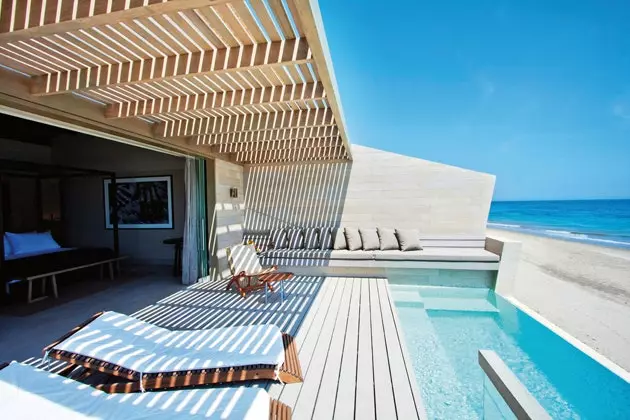
Hotel Arenas de Mancora
1,165 kilometers north of Lima and a stone's throw south of Ecuador, Mancora It's a small town built on three things: surfing, good weather, and anything visitors can do with the above two. I travel with the hope and the promise that Mancora will be like Malibu or like the island of Oahu 50 years ago. A surf spot unknown enough to be novel, fresh, fascinating, but capable of providing quality services to those who come this far.
On the way there, I realized how similar Mancora is to many other places in the world. The same skinny stray dogs, the same shops with tin roofs where you can buy beers and detergent, the same girls with their hair tied up in pigtails with beads of a thousand colors, the same eternal beaches, the waves, the dancing palm trees... I feel like I've been here before . Isn't this the place in Mexico where the big wave surfing competition is held or that town in Jamaica where the rustic motel that I liked so much was located?
I cross the city on a sand-covered road that leads directly to the seashore. A little later, something improbable, surprising emerges. Half a dozen structures built with large amounts of glass and stone. They resemble the expensive and exclusive resorts that are strung along the coast. I get out of the four by four, walk through a fortified entrance and there it is: a world of infinity pools and discreet beach loungers , and the vision of an endless beach about half a mile wide. Like a miniature version of Ian Schrager's tropical paradise. It was then that I realized that, after all, this place is not the same as the rest.
After checking into the Máncora Marina Hotel, I head straight to the delicious bar counter. I order a frozen margarita which is served with some crispy plantain chips. The unusually gray sky threatens rain. I wonder what Máncora will be like in high season. “Between December 29 and May 1, you won't find an available room for miles around,” Mariela, the hotel's charming assistant manager, assures me. “ Travelers come from everywhere : Chile, Argentina, Peru... from the United Kingdom, not so many”. And from the United States? Mariela smiles.
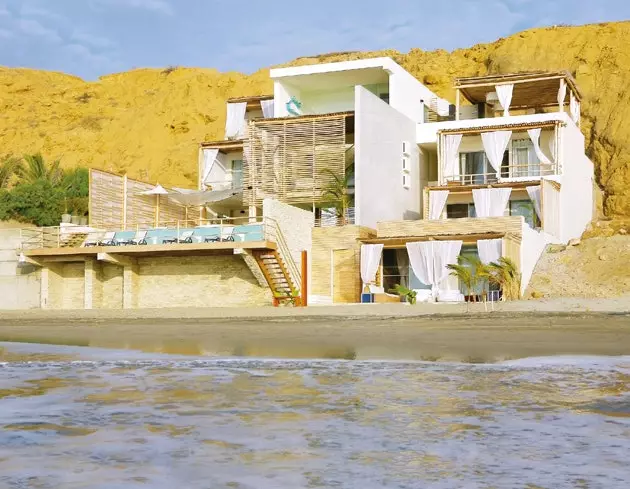
Hotel DCO Mancora
Before one daisy becomes two, I decide to approach the town. A town that gambles all its luck on a single card. And that card is The Mermaid . there is the restaurant The mermaid and La Sirena cafe and, despite the fact that there are a dozen bars, cafes and restaurants on the same street, once you enter the universe of La Sirena – with its rickety chairs, dim lighting, good music, smell of oil olive oil and fresh herbs– you don't want to go anywhere else to eat anymore.
I sit in the corner to watch how the tables are filled with hipsters (many locals) tanned while I decide on the menu. “Our specialty is tuna” Carlos announces to me, so smiling that it seems that he is about to tell a joke. "But really everything is great." He smiles again and winks at me. Either he has smoked something or he is the happiest waiter in the world (after several meals, I discover that it is the latter). “Tell me, Carlos, whose restaurant is this?” I raise my voice above the racket. Carlos smiles again. “Juan is a true Peruvian Mormon.” Are there authentic Peruvian Mormons? who will be the fakes? “A real Mormon?” I ask him. "Who's a Mormon?" answers Carlos perplexed. "John," I reply. “Hum, I didn't know”, now it's Carlos who looks at me as if I were the one who smoked. Again, more slowly, he repeats to me: "Juan is the new owner."
Juan Seminario is the owner, although he is not new. He opened La Sirena eight years ago, after studying at Le Cordon Bleu in Lima. “Máncora is a strange place,” Seminario assures me when we meet the next day. "At first it doesn't impress much, but after two or three days everything changes and in the end it ends up catching you. It's magic. As soon as you connect with his energy, you meet the people, you taste the food... everything changes. But of course, above all there is surfing ”.
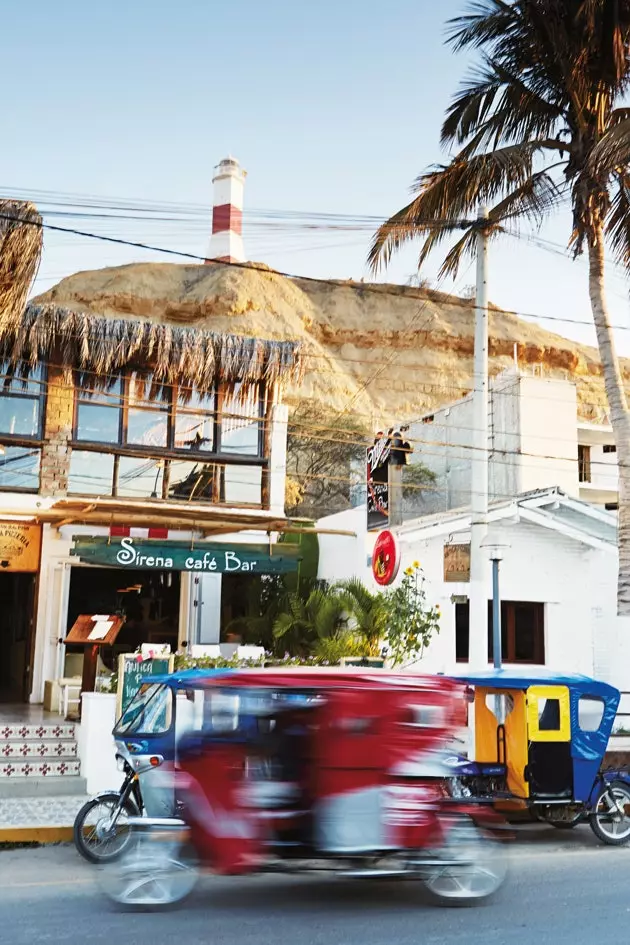
La Sirena Restaurant and Bar
Surfing is to Máncora what wine is to La Rioja. It is the reason to come. It is also the reason why, in recent years, Máncora has gone from being a small town with waves to a small town with waves, hotels with Egyptian cotton sheets and waterfall showers and chefs trained in Le Cordon Bleu. It's easy to understand why: the coast is blessed with a gentle and constant surf throughout the year. A few days in Máncora (two? three? one ends up losing count), the sun rises, and Máncora begins to feel at cruising speed. Everywhere you find details that remind you that you are in South America: fresh ceviche, sincere smiles, skinny horses, motorized rickshaws...
But on the beach surf culture is surf culture. And the center of all the action is The Point , a surf school housed in a palapa (a kind of open shack) where the kids hang out. Dark-skinned 20-somethings with ripped abs and mirrored sunglasses greet each other with their surfer mudras. v Live in a world before melanoma and crow's feet . The Point is run by Alan 'Maranga' Valdiviezo and his girlfriend, Evelyn Manzón . "I've been surfing in Máncora all my life," she tells me. Behind me, two surfers wax their boards. "We have witnessed the change in Máncora and how he has managed to preserve his character."
In Máncora one can decide not to move, stop exploring, or make it the starting point for a series of laid-back coastal towns where surfing is religion. A little further south is Los Órganos, known for its breakers and the size of its waves. And an hour further south is Lobitos, Mancora's older brother. Lobitos is where one goes when he wants to practice stand up paddle or when he seeks a more intense surf, or both. It is a place where you go exclusively for the waves. The beach is beautiful, but the refinery and oil rigs totally ruin the scenery.
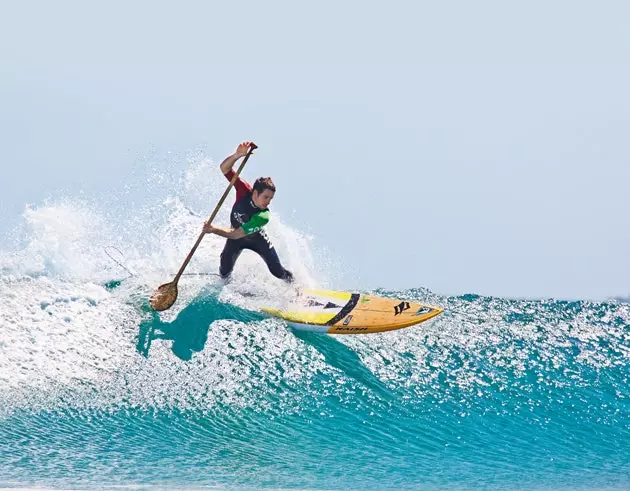
Stand up paddle in Lobitos
“The surfing in this whole area is fantastic as it's not that crowded” . Cristóbal de Col, 21, is a surfing star, and his image fills billboards. In 2006, Christopher was the world champion in the competition for under 14s and, since then, he has won all the titles that Peru can award to a surfer. In 2012 he entered the Guinness book of records for making the most maneuvers in a single wave (34 breaks in a wave in 2 minutes and 20 seconds).
We stand by a fire in the front yard of his house in Los Órganos, overlooking the Pacific. De Col lives here with his mother and his sister Nadia, a former professional surfer, and a varying number of relatives and friends. With their white smiles and sun-bleached locks, wherever they go they seem to hear Bob Marley's 'Stir it up'.
“Surfing has been part of our culture since the Incas,” De Col assures me. “There are waves here all year , good breakers, the water is warm and there is no danger because the sharks do not come close to the shore. I have surfed everywhere and there is no place as special as this.”
I wake up at six in the morning, have a cup of coffee and walk to the beach. The only other creatures awake at this hour are a squadron of pelicans soaring over the glassy surface of the Pacific. They hunt for breakfast. The day begins to open perfectly, warm and clear. This is the magic hour of Mancora. Out to sea, I see a dark shadow slowly breaking through the pristine water. It soon fades. And then another. Suddenly, three humpback whales rise to the surface and, a moment later, without making a sound, they disappear into their secret world, a calm world of warm waters on the shore of this very special place.
* This article is published in the May 74 Condé Nast Traveler magazine. This issue is available in its digital version for iPad in the iTunes AppStore, and in the digital version for PC, Mac, Smartphone and iPad in the virtual newsstand by Zinio (on Smartphone devices: Android, PC/Mac, Win8, WebOS, Rim, iPad) .
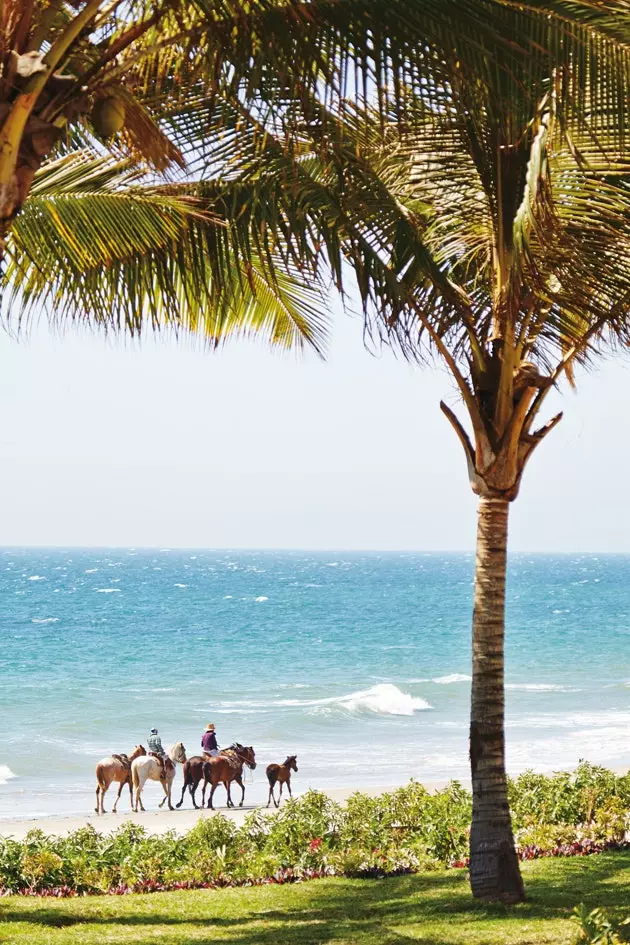
Horseback riding in Mancora
